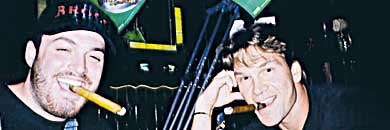Overnight (15)

The documentary genre has addressed the problem, too, notably in Chris Smith's brilliant essay American Movie about the would-be horror auteur Mark Borchardt, the Ed Wood of Menomonee Falls, Wisconsin. It offers the spectacle of a man so driven to get his "project" made that his perseverance passes through hopelessness and comes out the other side resembling a weird form of heroism. I thought of his example during Overnight, a new documentary about a Hollywood crash-and-burn, and was reminded that Borchardt, whatever else he lacked (talent, for instance), was never lost for charm. Troy Duffy could learn a lot from him.
Overnight recounts how Duffy rose from nowhere and, mostly through his own fault, booked himself a return ticket right back there. Whether it's a salutary tale is difficult to judge, but it's certainly an engrossing one. It begins in West Hollywood in 1996, just as bartender Duffy learns that his screenplay, The Boondock Saints, has been snapped up by Harvey Weinstein of Miramax. That's not all. As part of the deal, Weinstein will let Duffy and his yowling rock band The Brood provide the soundtrack, and he'll even buy the bar, J Sloan's, where Duffy works. You could say our man's hit paydirt. "He's gonna be so superbig," says his brother. Duffy himself reckons, "We'll deserve every ounce of recognition we get." The future looks bright. Jeff "Skunk" Baxter, the legendary one-time guitarist with Steely Dan, looks set to produce The Brood's album, while Duffy has just settled into a spanking new office from where he will begin casting his movie. You can tell how tickled he is to be calling the likes of "Branagh", even if he does get the answerphone. Meanwhile Tony Montana, one of the band's co-managers, has been filming these startling developments on a hunch that it will make a "very interesting documentary". Just how interesting Montana could hardly have known.
At this stage Duffy is merely guilty of being immoderately pleased with himself. On the one hand he knows that he's jammy, that he's riding a fluke; on the other, he thinks he's wonderful. Burly, bearded and bumptious, he's like an American cousin of David Brent, so eager to impose himself that he barely notices his effect on other people. "I know I'm one of the best there is," he says with a straight face. Hubris leaks into the atmosphere like poison gas. And, just as expectation reaches its zenith, things go on the teeter-totter, starting with Miramax putting Duffy's film into "turnaround" - seldom has the word so resonated.
Weinstein, famous for bawling people out, deals with Duffy in a much deadlier fashion: he refuses to take his phone calls. Then the record company backs out of their deal, leaving The Brood to, er, brood. "They're running scared," sneers Duffy of the music company, but he's not kidding anyone.
This sudden and savage reversal of fortune would test the most stoical temper. In Duffy's case the rejection is like petrol thrown on a bonfire. He boils. He rages. He tells just about everyone who tries to reason with him, even including his younger brother, to "fuck you!"
If Duffy were a character in a drama, you'd expect the director to have a quiet word with the actor and suggest that he dial it down a little so as not to lose the audience. But Duffy is no screenwriter's invention - he's really behaving like this. It occurs to you that being both a frustrated film-maker and a frustrated rock star will probably make someone twice the asshole. In any event, we watch Duffy struggle on, auditioning the likes of Paul Reubens, aka Pee-Wee Herman (who knows a thing or two about career meltdown), and later cracking up over one of Billy Connolly's deeply unfunny routines.
Somehow The Boondock Saints gets made, on a much-reduced scale, and Duffy and his crew take it to Cannes. Will this finally be an end to the humiliation? No, it won't, because every studio they petition turns it down.
Needless to say, Duffy eventually falls out with Montana and his co-director Mark Brian Smith, which may explain why the whiff of settled scores hangs over the film. A postscript quotes the biographer Albert Goldman to the effect that success doesn't change anyone, it's simply that whatever character traits were already there will be smoked out by its effect and reveal that person as he or she truly is. Maybe so, but I think the presence of the camera must also be taken into account: the insidious way it encourages its subjects to amplify and exaggerate their reactions will generally distort whatever truth it may be reaching towards. And when that subject is as prone to delusion and self-aggrandisement as Duffy - or, indeed, the man who could be his egomaniacal twin, Anton Newcombe from last week's DiG! - then the possibility of presenting a balanced case more or less evaporates.
"With all due respect," Duffy says, always in preface to some hurtful or disparaging remark. As this shamefully entertaining film makes plain, he doesn't really have respect for anything, aside from the prospect of his own rise to stardom. And, on this evidence, that prospect looks ever more distant.
Join our commenting forum
Join thought-provoking conversations, follow other Independent readers and see their replies
Comments
Bookmark popover
Removed from bookmarks